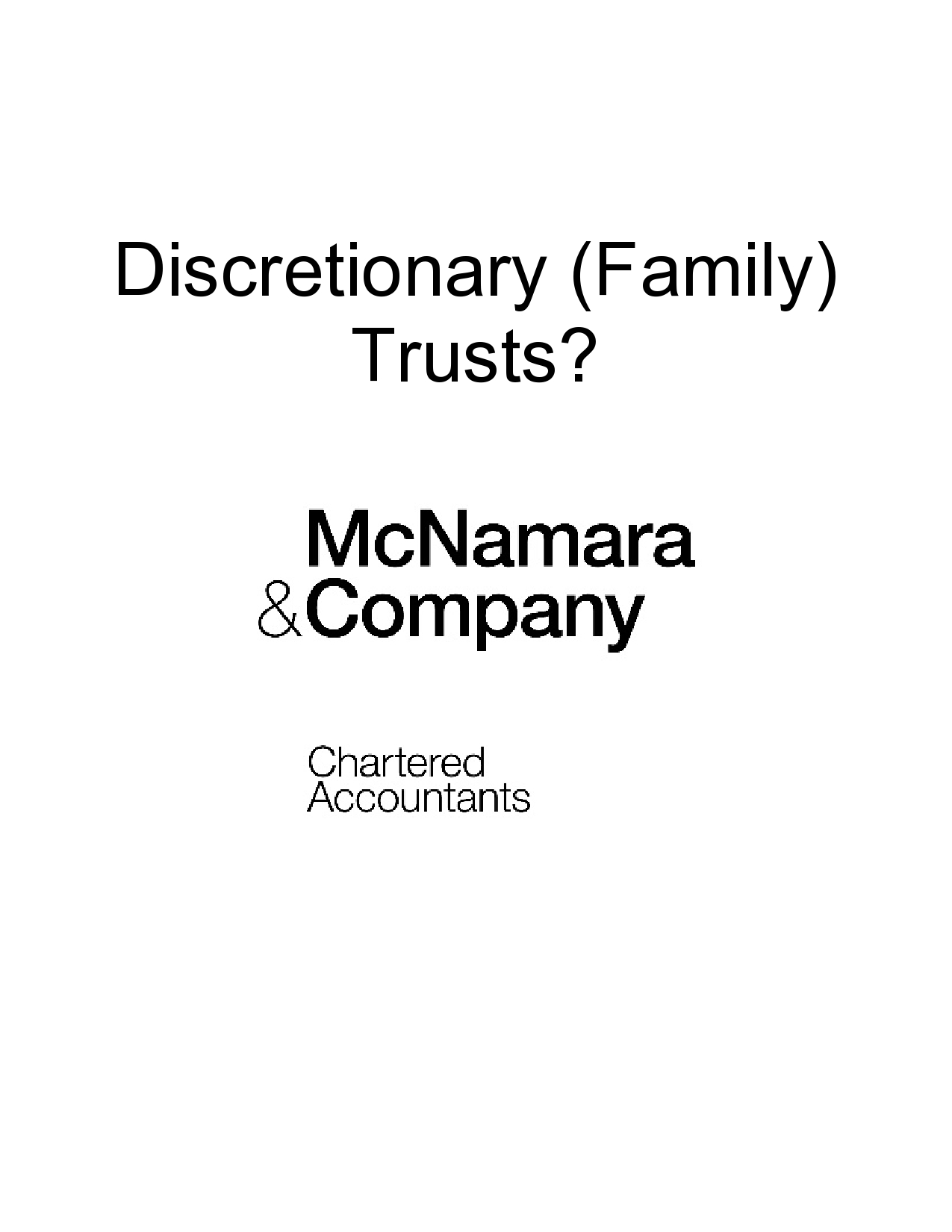
Also known as a Discretionary Trust, it is essentially a relationship that is set out by a trust deed between a trustee and a beneficiary or beneficiaries. The trustee is given the duty of holding property on behalf of the beneficiaries. A Trust unlike other accounting and taxation entities separates the legal ownership of property and the beneficial (equitable) ownership. The different roles / parties in a family trust include:
The Settlor: The Settlor is the person who "settles" a discretionary / family trust. They do this by providing the seetled sum Trustee (or Trustees).
The Settlor must also actually pay the settled sum. If they don't the trust will not be settled and thus never have existed. For a trust to exist there must be trust property, typically the trust property will start out being the settled sum, i.e., $100.
The Trustee: The trustee(s) (there may be more than one) of a trust may be a person or a company (corporate trustee). In either case, the trustee(s) must be legally capable of holding trust property in their own right. The trustee(s) holds the trust property for the benefit of the beneficiaries.
Where the trust is established by deed (which in the case of a deceased estate is the will), the trustee(s) must deal with the trust property in line with the intentions of the settlor which is prescribed in the trust deed. They must also act in accordance with the relevant state or territory law regulating trusts, and with any other applicable law, including tax law.
The Appointor: The appointor (or appointors) of a trust have the real power and control of the assets of a trust. The appointor(s) have the power to appoint and remove trustees. In the majority of cases, the original appointor(s) will also benefit when the trust is established.
The Beneficiaries: A trust beneficiary can be a person, a company or the trustee of another trust. The trustee may also be a beneficiary, but not the sole beneficiary unless there is more than one trustee. Beneficiaries may have an entitlement to trust income and / or capital that is set out in the trust deed or they may acquire an entitlement because the trustee exercises a discretion to pay them income or capital.
Generally, the beneficiaries are taxed on the net income of a trust based on their share of the trust's income – regardless of when or whether the income is actually paid to them. If the trust’s income is not distributed by the end of the financial year the trustee will be taxed at the top marginal rate.
The Trust Deed:A trust deed is a legal document that sets out the rules for establishing and operating your trust. It outlines the fund’s objectives, who can be a member and whether benefits can be paid as a lump sum or income stream.
The trust deed must be:
- prepared by someone competent to do so, i.e., a lawyer as it is a legal document;
- signed and dated by all trustees;
- properly executed according to state or territory laws; and
- regularly reviewed and updated if needed.
Taxation planning: The process of organising the affairs of a taxpayer or a group of taxpayers so that, as far as legally or commercially possible, the taxation liability(ies) of the taxpayer or group of taxpayers is minimised.
Tax planning is not limited to complex, high risk or sophisticated arrangements. Taxpayers contemplating even the most ordinary transactions should give proper consideration to tax planning to ensure that their tax position is e tax consequences.
Asset protection: Has always been one of the main considerations when selecting a business structure.
Asset protection planning attempts to:
- Separate the owners or operators of a business from the risks of doing business;
- Separate the assets of the business from the business; and
- Protect that business from risks that the owners and operators themselves face.
Businesses and owners mainly need to be protected against financial risk - that is the chance that an event will occur that causes creditors to make a claim on the business or owner that cannot be satisfied by their assets.
ln addition to financial risks, individuals face two other risks not faced by businesses, the risk that they will die, or go through a relationship breakdown. Asset protection planning has received much attention recently due to the steadily increasing cost of obtaining risk insurance, as well as some highly publicized corporate collapses.
Estate Planning: Estate planning involves developing a strategy to deal with your assets after you die. This is typically done through legal documents such as a will and binding death benefit nominations.
Tax is a major consideration in estate planning. Planning in advance will help minimise the tax liabilities of your family group.
If you would like to discuss further please contact us:
McNamara & Company - Chartered Accountants, located minutes from the Melbourne CBD
www.mcnamaraandcompany.com.au/contact-us
Phone +61 3 9428 1062
Email admin@mcnamaraandco.com
Please refer to disclaimer at the bottom of the page.

